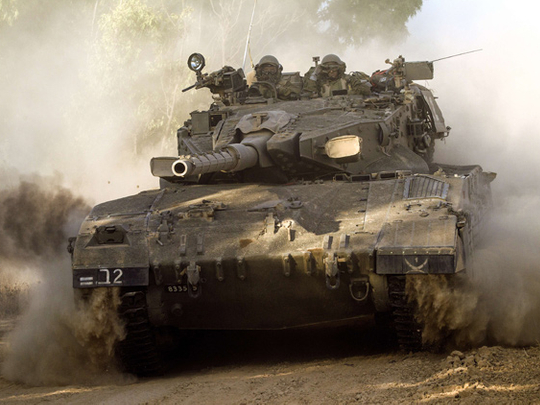
Dubai: No end was in sight to hostilities on Thursday as casualties and injuries mounted amid escalating missile exchanges between the Israeli military and Gaza militants.
For the second day in a row, retaliatory rockets fired by Palestinian militants reached the seaside metropolis of Tel Aviv, the country’s financial capital. Meanwhile, the death toll reached 77 in the Gaza Strip after at least 77 hours of Israeli bombardment.
Intense Israeli airstrikes continued overnight throughout the Gaza Strip, where black pillars of smoke have been rising since the Israelis launched operation ‘Protective Edge’ before dawn on Tuesday after blaming Hamas for the killing of three Israeli teens.
The deaths in Gaza included seven people who had been watching the World Cup semi-final match between Argentina and the Netherlands at a seaside coffee shop. Other victims included eight members of one family who were killed when their house was destroyed in the Israeli bombardment.
Many of the dead in Gaza were civilians hurt by flying shrapnel or in airstrikes against the houses of suspected militants, witnesses said. More than 550 Palestinians have been injured, reported the Al Ray news agency of Hamas, which de facto controls the densely populated coastal enclave.
Meanwhile, many of the missiles fired at Israel’s largest cities were shot down by the Israeli so-called ‘Iron Dome’ missile defence system.
Air raids sounded in Tel Aviv at 8am (0500 GMT) for the second morning in a row, followed by several loud explosions.
Israel’s Channel 2 reported that five missiles were downed over the greater Tel Aviv area. An Israeli military spokesperson said she could only immediately confirm one interception. Israeli forces on the ground were still checking whether there were any impacts.
The Israeli military has called up 20,000 reserve soldiers for a possible ground offensive, spokesperson Peter Lerner said. The Israeli government at the start of the offensive authorised the military, in principle, to call up double that number.
A ground offensive remained a last resort and the Israelis were still weighing the pros and cons, Lieutenant Colonel Lerner told reporters.
He said the offensive is more intense than the last incursion into Gaza, in November 2012. Within 48 hours, the Israel Air Force has attacked 750 targets, compared to 1,450 in the eight days of fighting in 2012.
Israeli President Shimon Peres has warned that a ground offensive against Gaza may take place quite soon. “If they will stop [firing rockets from Gaza] for example tonight, there won’t be any ground entrance, but if they will continue, sooner or later this will be the response,” Peres told CNN.
The regime’s foreign minister Avigdor Liberman earlier said, “Not all terrorist targets can be destroyed from the air.” Liberman has proposed that only a full-scale return of Israeli control to Gaza would end the rocket fire. “We need to understand that after we did two operations — Cast Lead and Pillar of Defence — the real alternative is the full occupation of the strip,” he told the Israeli Army Radio.
The Hamas has welcomed the talk of a ground offensive, saying that is just what it’s been waiting for.
“Hamas commandos who have just raided the Israeli military base of Zakim are patiently waiting for such a ground confrontation if Israel dares to launch it,” said Sami Abu Zuhri, the Hamas spokesperson, in a statement. “Peres’ comments are ridiculous and do not intimidate us at all. The ground confrontation with Israel is welcomed any time and our militants are ready for it,” he said.
Political analysts and commentators have downplayed the possibility that Israel will launch a ground offensive against Gaza. “The situation is Gaza is expected to inflame more,” said Talal Okal, a Gaza-based political analyst. “More escalations, blowing up houses and political assassinations are on the horizon with no room for calm,” he told Gulf News. He predicted that mediators will start intervening and put massive pressure on the various sides in order to secure a truce.
Hamas has claimed responsibility for the latest rockets launched toward Tel Aviv.
A 4-year-old boy died of shrapnel wounds sustained in an Israeli airstrike on an agricultural field north of Gaza City, Al Ray reported.
Three militants of the Quds Brigades — the armed wing of the Islamic Jihad faction, which has claimed responsibility for many of the long-range missiles launched deep into Israel — were killed in a targeted air strike against their car in northern Gaza City on Thursday morning.
The eight members of one family were killed when the Israelis bombed the house of a suspected militant in the southern Gaza Strip city of Khan Younis before dawn. Hamas claimed that the Haj family had not received an advance telephone warning from the Israeli military, despite Israeli claims that it calls intended targets before an attack.
An Israeli military spokesperson was not immediately able to specify what the intended militant target had been and said Israel was checking incidents of civilians deaths. The occupation often says that it investigates the death of civilians.
Rockets launched from Gaza are meanwhile striking further north than ever before, with some witnesses reporting strikes as far north as the Hof Hacarmel region, just south of the port city of Haifa. The Israeli military has neither confirmed nor denied these accounts.
Hamas also said it had targeted Israel’s nuclear reactor in Dimona.
Either incident would represent an escalation in the conflict, greatly increasing tension on the Israeli side.
— With inputs from DPA












